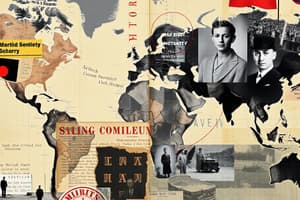Podcast
Questions and Answers
Quins factors van influir en l'expansió europea durant els segles XIX i XX?
Quins factors van influir en l'expansió europea durant els segles XIX i XX?
L'expansió europea va ser impulsada per factors com la competència econòmica, els avantatges estratègics, les rivalitats polítiques, el nacionalisme i la superioritat tecnològica.
Quina idea justificava les accions europees durant l'època colonial?
Quina idea justificava les accions europees durant l'època colonial?
- La responsabilitat de civilitzar els pobles colonitzats (correct)
- La necessitat de posar fi a l'esclavitud
- La superioritat de la cultura europea
- El paper de la religió en la colonització
Els governs colonials sempre van aplicar un sistema directe de govern.
Els governs colonials sempre van aplicar un sistema directe de govern.
False (B)
Com es manifestava l'explotació de les poblacions colonitzades?
Com es manifestava l'explotació de les poblacions colonitzades?
Quines formes de resistència van adoptar els pobles colonitzats?
Quines formes de resistència van adoptar els pobles colonitzats?
Quins desafiaments va afrontar el sistema colonial?
Quins desafiaments va afrontar el sistema colonial?
Com es va veure afectat el món a causa de l'imperialisme europeu?
Com es va veure afectat el món a causa de l'imperialisme europeu?
L'impacte de l'imperialisme ha desaparegut completament.
L'impacte de l'imperialisme ha desaparegut completament.
Flashcards
Expansió europea
Expansió europea
L'expansió d'Europa als segles XIX i XX, impulsada per factors polítics, econòmics i socials.
Carrega de l'home blanc
Carrega de l'home blanc
Ideologia que justificava la colonització com una missió de civilització.
Competència econòmica
Competència econòmica
Necessitat de matèries primeres i mercats per a impulsar el creixement industrial a Europa.
Avantatges estratègics
Avantatges estratègics
Signup and view all the flashcards
Rivalitats polítiques
Rivalitats polítiques
Signup and view all the flashcards
Nacionalisme
Nacionalisme
Signup and view all the flashcards
Superioritat tecnològica
Superioritat tecnològica
Signup and view all the flashcards
Administració directa
Administració directa
Signup and view all the flashcards
Administració indirecta
Administració indirecta
Signup and view all the flashcards
Explotació econòmica
Explotació econòmica
Signup and view all the flashcards
Marginació política
Marginació política
Signup and view all the flashcards
Desigualtats socials
Desigualtats socials
Signup and view all the flashcards
Supressió cultural
Supressió cultural
Signup and view all the flashcards
Resistència colonial
Resistència colonial
Signup and view all the flashcards
Crisi econòmica
Crisi econòmica
Signup and view all the flashcards
Nacionalisme colonial
Nacionalisme colonial
Signup and view all the flashcards
Depència econòmica
Depència econòmica
Signup and view all the flashcards
Instabilitat política
Instabilitat política
Signup and view all the flashcards
Disrupció social i cultural
Disrupció social i cultural
Signup and view all the flashcards
Canvis en el poder global
Canvis en el poder global
Signup and view all the flashcards
Impacte ambiental
Impacte ambiental
Signup and view all the flashcards
Llegat perdura
Llegat perdura
Signup and view all the flashcards
Study Notes
European Domination of the World: Colonialism and Imperialism
-
European expansion in the 19th and 20th centuries was characterized by a complex interplay of political, economic, and social factors.
-
The concept of "the white man's burden" justified European actions, portraying colonialism as a benevolent civilizing mission. This idea, while often used as propaganda, obscured the underlying economic and political motivations.
-
Colonialism and imperialism were driven by a wide range of factors:
- Economic competition: European nations sought raw materials and markets to fuel industrial growth. The need for resources like rubber, cotton, spices, and minerals significantly motivated colonial acquisitions.
- Strategic advantages: Control of resources facilitated military and geopolitical ambitions. Access to strategic ports and naval bases boosted national power.
- Political rivalries: European nations competed for power and influence, often leading to conflicts and escalating colonial ventures.
- Nationalism: Intense national pride and ambition fueled imperial ambitions. Claims of cultural superiority and a perceived duty to spread "civilization" played a powerful role.
- Technological superiority: Advancements in weaponry and navigation gave Europeans a significant advantage over colonized populations in military and exploration contexts. Steamships, rifles, and improved navigation tools were key factors in conquest.
Colonial Administration and Exploitation
-
Colonial administrations were often characterized by direct rule or indirect rule.
- Direct rule involved imposing European administrative structures on colonized territories.
- Indirect rule aimed to utilize existing local political systems, often for the purpose of manipulating them to European advantage. This approach could yield more effective local administration but seldom benefited the colonized population in the long term.
-
The exploitation of colonized populations manifested in various forms:
- Economic exploitation: Colonies were often forced to contribute raw materials and resources to the benefit of European industries, while being denied access to more advanced technologies and industrial development.
- Political marginalization: Indigenous populations were often denied political participation and representation in colonial governments.
- Social inequalities: Racial segregation and discrimination were common, with Europeans enjoying better living conditions, opportunities, and rights than the colonized peoples.
- Cultural suppression: European cultures were often imposed, leading to the suppression or devaluation of indigenous languages, beliefs, and traditions.
Resistance and Challenges to European Domination
-
Throughout the period of European dominance, colonized peoples engaged in varying forms of resistance:
- Armed revolts and uprisings: Many colonized populations rebelled against European rule.
- Political activism: Indigenous groups formed political organizations and sought to achieve self-determination.
- Cultural preservation: Efforts to maintain and revive indigenous cultures often surfaced as forms of resistance and assertion of identity.
-
The European colonial system faced various internal and external challenges.
- Economic crises: Global economic fluctuations and internal conflicts in European powers could weaken colonial empires.
- Rise of nationalism in colonized societies: Indigenous populations increasingly demanded independence and self-determination.
- Opposition from within Europe: Anti-colonial movements and resistance within European societies also challenged colonial ideals and justified national revolts by the marginalized.
Consequences of European Imperialism
- The spread of European influence had a profound and lasting impact on colonized societies and the world:
- Economic dependency: Many former colonies remained economically dependent on former colonial powers. This dependency often persisted long after formal independence.
- Political instability: The legacy of European colonialism continues to pose challenges to political stability in many regions.
- Social and cultural disruption: The imposition of foreign cultures and administrative systems led to social and cultural conflicts and fragmentation.
- Global power shifts: The colonial era reshaped global power dynamics, creating a new world order shaped by European dominance.
- Environmental impact: Excessive exploitation and resource extraction impacted local ecosystems in detrimental ways.
Imperialism's Enduring Impact
- The legacy of colonialism and imperialism continues to shape the world today, affecting economic, political, and social relations.
- Patterns of global inequality and disparity persist, rooted in the historical imbalances created by these systems.
- Many nations confront legacies of colonial exploitation and struggle to overcome the ongoing socioeconomic effects.
- Issues like border disputes, ethnic conflicts, and economic disparities can be traced back to the era of European dominance.
Studying That Suits You
Use AI to generate personalized quizzes and flashcards to suit your learning preferences.




